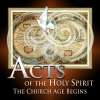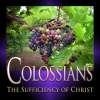
Tuesday, October 02, 2012
by Robert Dean
Passage: Acts 9:19-22
Series: Acts (2010)
Duration: 1 hr 7 mins 32 secs
The conversion of Saul on the road to Damascus is the historical account of an event that had enormous consequences for the Church. Paul’s entourage witnessed this event on their way to round up and persecute believing Jews. Saul was blinded, emotionally stunned, and intellectually challenged. Intense prayer and fasting were the result of Saul’s narrowed focus on the ramifications of this event. After strengthening with food, Saul immediately preached Christ in the synagogues. What does it mean to “preach Christ?” What is the difference between preaching and teaching? What was the response? What are the parallels in Paul’s message and the first message of Jesus when He taught in Nazareth? What is the importance of our physical and spiritual strengthening to the message the Church carries to the world?

Tuesday, October 09, 2012
by Robert Dean
Passage: Acts 9:32-43
Series: Acts (2010)
Duration: 1 hr 3 mins 46 secs
This section of Acts shifts focus to Peter and his preparation to present salvation to the Gentiles. See how and where God leads Peter into Gentile territory armed with his apostolic credentials. In whose name does Peter use these credentials? Look at parallel passages where Jesus heals and why the Jews should have understood these miracles as signs revealing Jesus as Messiah. How does healing in the Old Testament become another link connecting the signs the Jews refused to see? How does Peter’s vision in chapter 10 reveal a new direction from Law to grace in an entirely new focus that reaches out to Gentiles who want to know God?

Tuesday, October 16, 2012
by Robert Dean
Passage: Acts 9:32-10:8
Series: Acts (2010)
Duration: 1 hr 4 mins 5 secs
Follow the geographical route taken to fulfill God’s promise to Abraham that through him all nations will be blessed. In these cities Peter makes it clear he is healing in the power of Jesus Christ. Peter is establishing his credentials with the same sorts of commands Jesus used to heal. The result was, “Many believed in the Lord.” Must you also ask Jesus into your heart? Does the fact that Peter is staying with Simon the Tanner reveal anything about Peter that shows he is accepting changes that are moving away from Jewish ritual? Meet Cornelius: his occupation, his home, his spiritual status, and his response to the angel he encounters.

Tuesday, October 23, 2012
by Robert Dean
Passage: Acts 10:9-43
Series: Acts (2010)
Duration: 1 hr 5 mins 25 secs
Jewish religious practice at this time observed strict separation from Gentile culture, even though the Jews did have a level of missionary activity. To disrupt centuries of tradition was truly revolutionary. Peter’s encounter with Cornelius, carefully orchestrated and revealed by God, signals a complete change of direction from strict observance of the law exclusive to the Jew, to universal inclusion of the Gentile in Grace. Peter had to contemplate the enormity of this change, but lost no time in obeying God and going to Cornelius in Caesarea. Cornelius and his family responded to Peter’s revelation of Truth. See how Cornelius and his family acted to fulfill God’s sign to the Jew of a judgment to come for national rejection of their Messiah.

Sunday, November 11, 2012
by Robert Dean
Passage: Colossians 3:18-21 & Ephesians 5:25-33
Series: Colossians (2011)
Duration: 46 mins 10 secs
The issue in these passages is for husbands to love their wives. The analogy is to love as Christ loves the Church. You must understand the gospel in order to understand this kind of love. The purpose for Christ’s love for His Church is to sanctify, purify and present her to Himself without residue of sin, eternally set apart to God. A Christian marriage is a training aid to show the world the relationship between Christ and His Church. Learn how elements of doctrine are revealed through marriage and its unique oneness lived out through different roles with distinct identities.

Sunday, December 16, 2012
by Robert Dean
Passage: Colossians 4:2-18
Series: Colossians (2011)
Duration: 58 mins 45 secs
Prayer has high priority in scripture. It is good to interrupt and reevaluate a routine filled with responses to small crises. Prayer deserves focused attention, reflection, and concentration, which require time. God communicates with us through His Word. Our response is to communicate with Him through continual prayer and obedience in application of scripture. Since God’s revelation in scripture is sufficient, there is no need for Him to grant us new revelation in His answer. What are the categories of prayer? What specific prayer is Paul asking for as he continues to spread the gospel? How does the request to walk in wisdom apply when we try to communicate the gospel message? Find out to whom Paul gives his final greetings in Colossi and the roles they have had in Paul’s life.Note: Due to technical difficulties the audio and video may be out of sync on the video of this class.

Tuesday, December 18, 2012
by Robert Dean
Passage: Acts 13 & Matthew 16:15-18
Series: Acts (2010)
Duration: 59 mins 1 sec
Acts is a transition, a historical narrative that is descriptive, not a prescriptive pattern of what happens in the Church today. The phenomena of the church growth movement in the late 60s based church growth on sociological issues and stressed experience as a validation of the Bible. As is often the case with Satan’s plan, this method seemed to work. But understand fully the instruction Jesus gives Peter to feed His lambs while He builds the church. Jesus doesn’t tell Peter to manage an organization through techniques in church growth, but instructs him to proclaim and teach. Review Paul’s journeys and allow instruction from his many discourses to teach us how we can maximize our approach with the message of God’s Word to people in our lives with differing backgrounds.Also includes John 21:15-17

Tuesday, January 22, 2013
by Robert Dean
Passage: Acts 13:1-25
Series: Acts (2010)
Duration: 1 hr 2 mins 33 secs
The gift of prophesy still existed in Acts before direct revelation ceased after the Canon was complete. The Holy Spirit, in specific divine guidance, actually called out Barnabas and Saul (who certainly had this gift), to take the gospel to these destinations. Learn the meaning of Saul’s name and the significance of his new name. Travel their path; encounter their resistance and the positive response. Learn about how the synagogue functioned. See how Paul spoke to these Jews, encapsulating Jewish history and focus in few words and introducing its long-awaited fulfillment through the death and resurrection of Jesus Christ. We learn that evangelism may be most effective when the presentation is specific to the hearer.

Tuesday, February 19, 2013
by Robert Dean
Passage: Acts 13:13-39
Series: Acts (2010)
Duration: 1 hr 5 mins 26 secs
As we see Paul focus on the gospel with the Jews in Antioch in Pisidia, we should be aware of some modern evangelistic challenges seen through a comparison of Lordship Salvation and Free Grace. Those in Paul’s audience knew the scriptures, so it was effective for him to string together prophesies pointing to Christ. Review many of these Old Testament promises and see the familiar terms imputation, justification, forgiveness, propitiation, righteousness, and Christ the Servant. How does the resurrection seal the fulfillment of the Messianic prophesies? Do these Jews respond to Paul’s message?

Tuesday, February 26, 2013
by Robert Dean
Passage: Acts 13:40-52
Series: Acts (2010)
Duration: 1 hr 6 mins 41 secs